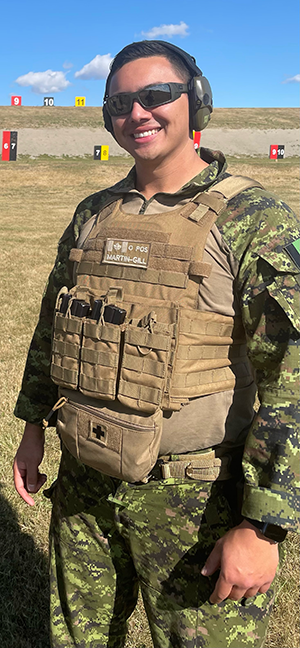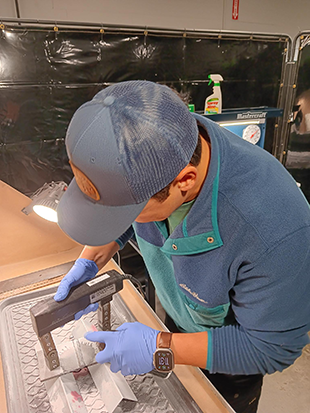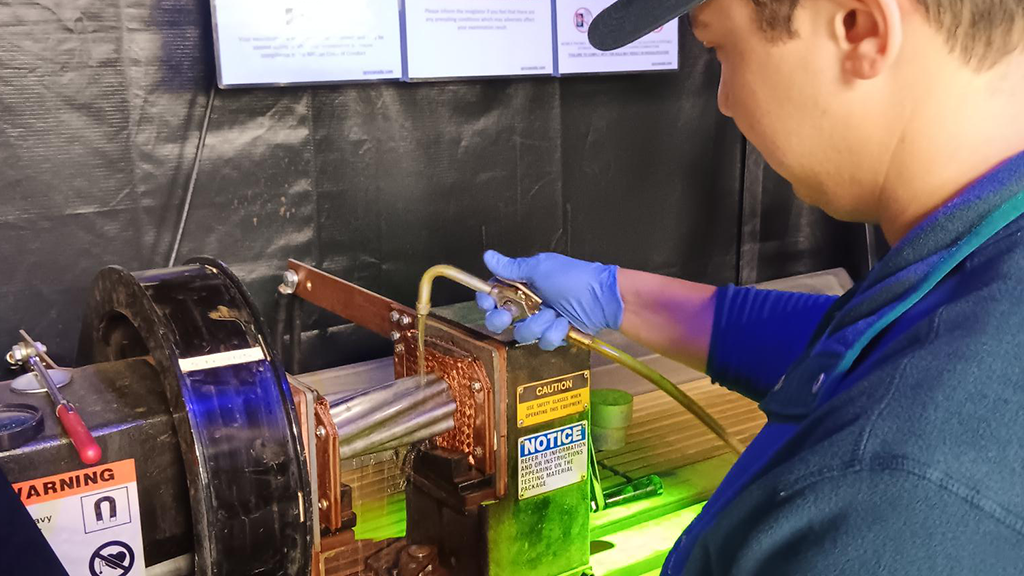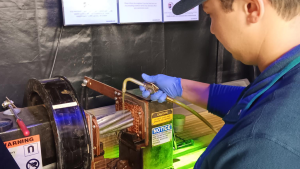Like hundreds of Canadian military veterans, Ethan Martin has made the not insignificant transition to civilian life and a construction career through Helmets to Hardhats (H2H), the non-profit organization that connects veterans, military members and their families to careers in the unionized industry.
But the former Canadian Armed Forces signals operator is in the vanguard of an enhancement of that program.
This past winter he and two other former soldiers became the first H2H cohorts to receive specialized non-destructive testing (NDT) training offered by the Quality Control Council of Canada (QCCC).

Now working for Team Industrial Services, his goal is to become a certified NDT technician.
Recognized for excellence with multiple commendations and awarded with both the Canadian Basic Parachutist Wings and American Parachutist Wings during his 11 years of service, Martin wasn’t sure of direction he wanted to take after leaving the military.
Then heard about H2H and joined up.
“My experience with Helmets to Hardhats (H2H) has been great and they were extremely helpful in starting my career as an NDT technician. Only a few months after signing up I was put in a pilot project headed by H2H and the QCCC to receive magnetic particle inspection training.”
The training Martin and the two others received consists of two one-week modules.
The first is a Materials and Processes introductory course which covers material properties and structures, basic steel making, non-ferrous materials, castings, basic welding terminology, metal forming, corrosion, heat treating, mechanical properties and flaws.
From there the students advanced to the Magnetic Particle Level 2 module. Consisting of a series of lectures and labs, it provides knowledge of magnetic particle inspection and is fundamental to inspecting surface and near-surface discontinuities.
Following the completion of those modules, Martin was able to obtain his present position through the efforts of H2H and QCCC.
“As soon as I was done my course, I was hired.”
Sixty days of on-the-ground work with a QCCC contractor are required before students are eligible to write an exam and successfully complete a practical test to achieve the Magnetic Particle Inspection Level 2 Certificate, says Brent Hunt, one of the council’s national directors.

Upon completion of the certificate, they join either the United Association of Plumbers and Pipefitters Union or the International Brotherhood of Boilermakers, which are the council’s parent organizations, he says.
Two more former veterans have been accepted to receive specialized non-destructive testing. But the council has to be careful about many trainees it takes in, says Hunt.
“Ours is a small industry and we need to take a cautious approach because we don’t want to train people and then they can’t find jobs.”
Still, H2H executive director James Hogarth says specialized non-destructive testing provides a critical pathway for veterans and transitioning military members to secure stable, high-value careers.
“With Ethan (Martin) leading the way, the training is off to a promising start. It’s incredible to witness our veterans progressing so quickly into the workforce. This program is a testament to the skills and dedication they bring to the trades.”
The training Ethan and the others received is a direct result of a $3 million three-year funding agreement H2H secured from the Ontario government last fall, says Hogarth.
And it’s not the only expansion of the services H2H is providing, he says.
Earlier this year H2H announced it was partnering with the Alberta government to deliver the Skilled Pathway Program, an initiative aimed at equipping Alberta’s veterans, reservists and their immediate family members with the preparation and skills needed for careers in the province’s unionized construction industry.
Now operational, the first-of-its-kind program in Alberta focuses on providing veterans and reservists with the necessary certifications and training to bridge the gap between military service and the growing demand for skilled labour in in the province by providing a pathway into one of 14 building trades unions. There will be an initial cohort of 40 trainees, says Hogarth.




Recent Comments